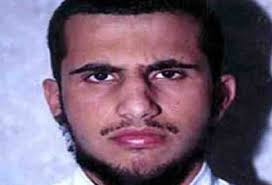The alleged leader of Al-Qaeda’s Khorasan Group was killed in an air strike by the US-led coalition in northern Syria.
 The alleged leader of Al-Qaeda's Khorasan Group was killed in an air strike by the US-led coalition in northern Syria, the Pentagon said late Tuesday.
The alleged leader of Al-Qaeda's Khorasan Group was killed in an air strike by the US-led coalition in northern Syria, the Pentagon said late Tuesday.
The "kinetic strike" killed Muhsin al-Fadhli on July 8 while he was traveling in a vehicle near Sarmada, Syria, Pentagon spokesman Captain Jeff Davis said.
He did not confirm whether a drone or a manned aircraft had killed Fadhli.
Fadhli was allegedly the leader of the Khorasan Group, a group of senior Al-Qaeda members who have traveled from Central Asia and elsewhere in the Middle East to Syria to plot attacks on the West.
Fadhli "was a senior Al-Qaeda facilitator who was among the few trusted Al-Qaeda leaders who received advance notification of the September 11, 2001, terrorist attacks on the United States," said Captain Jeff Davis, a Defense Department spokesman.
"His death will degrade and disrupt ongoing external operations of Al-Qaeda against the United States and its allies and partners."
Davis, who heads the Defense Department's press operations, said Fadhli was also involved in October 2002 attacks against US Marines on Kuwait's Failaka Island and on the MV Limburg, a French oil tanker.
He was reported to have been previously targeted in a US air strike in September, but his death was not confirmed by US officials at the time.
US intelligence says the Kuwaiti-born militant fought alongside the Taliban and Al-Qaeda in Pakistan, according to the State Department.
The US National Counterterrorism Center has said he had become Al-Qaeda's senior leader in Iran.
Fadhli was a major facilitator to late militant Abu Musab al-Zarqawi, who once led Al-Qaeda in Iraq, and other fighters against US and multinational forces.
He was designated by the US Treasury Department for providing financial and material support to Zarqawi's network and Al-Qaeda.
The UN Security Council's Al-Qaeda Sanctions Committee cited him in 2005 for his role in planning, facilitating and financing Al-Qaeda attacks, which triggered a freeze on his assets and a travel ban.
The US State Department had posted a $7 million reward for information leading to Fadhli's death or detention. He was wanted by law enforcement authorities in Kuwait, Saudi Arabia and the United States for terrorist activities.